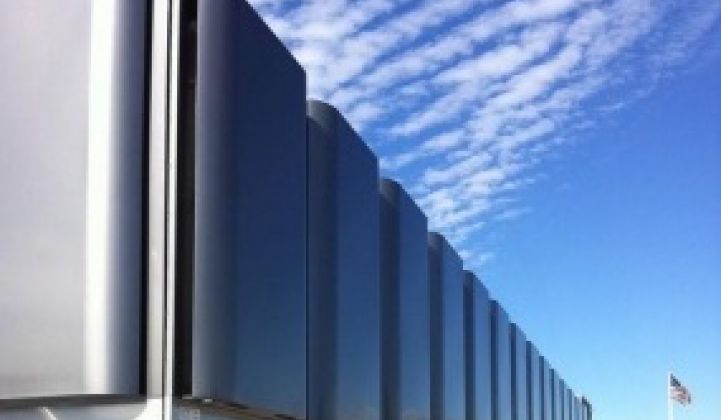Millions in private funding continues to roll in for Bloom Energy, the high-profile, well-connected fuel-cell vendor. The latest cash infusion is $130 million, raised from undisclosed investors, according to the WSJ.
Over the years, board members and executives at the $1.2 billion fuel-cell startup have spoken of an imminent IPO, imminent profitability and imminently returning phone calls from members of the press.
None of these events have come to pass.
Bloom is "looking to raise $160 million in the form of convertible notes, of which about $130 million had been raised by Dec. 19," according to Venture Capital Dispatch. The funding information was in an email to clients from Spruce Investment Advisors, "a manager of funds that hold Bloom shares, viewed by VentureWire. It is unclear who provided the $130 million." The article suggests that Spruce is handling what were once the clients of the now-defunct (and the then-disreputable) Advanced Equities.
The company has raised more than $1.2 billion, has a roster of premier paying customers, and a knack for absorbing state subsidies intended for clean, renewable power. (Bloom Energy's fuel cell is very arguably not cleaner than fossil fuels, while natural gas is not considered a renewable resource.)
The 11-year-old startup claims to have installed more than 130 megawatts of its Bloom boxes in the U.S.
We've reported on Bloom's spectacularly negotiated deal with Delaware utility Delmarva Power. We've covered the debatable "greenness" of the Bloom fuel cell. We've profiled the fuel cell industry as a whole. Last year, Bloom took in $50 million from The New Zealand Superannuation Fund, while Exelon, the Chicago-based competitive energy provider, agreed to finance 21 megawatts of Bloom's fuel-cell deployments in any state with a favorable subsidy regime. Investors in the firm include KPCB, NEA, Advanced Equities, Goldman Sachs, DAG, GSV Capital, Apex Venture Partners, Mobius Venture Capital, Madrone Capital and SunBridge Partners. Board members include John Doerr of KP, AOL founder Steve Case, and former U.S. Secretary of State Colin Powell.
Over the years, we've heard less-than-positive things from a number of sources about the reliability of the Bloom fuel-cell stack. In fact, we've heard that the fuel-cell stack has a lifetime of six months to a year before it needs to be serviced. Bloom has an electricity sales business, Bloom Electrons, which eliminates much of the risk for the customer, as well as a leasing and ownership structure.
An investor in the cleantech sector suggests that the Bloom business is not financially sustainable and will show signs of decline once the larger brand-name VCs close their latest funds.
But we hear positive views as well.
Another investor colleague writes, “We continue to hear good things about Bloom’s operating progress from the market, and the structure of these notes appears to suggest [the company] will need to file for an IPO sometime over the next twelve to eighteen months in order to hit the indicated window."
A third anonymous investor comments, "“While Bloom may eventually achieve an IPO, it is unlikely to produce a particularly happy outcome for its venture investors. That $1.2 billion would likely have had greater economic and environmental impact if it was spent on an array of much more capital-efficient solutions -- for example, financing of solar and energy efficiency projects. The fact that institutional investors have poured, and continue to pour, so much money into Bloom says less about the merit of Bloom as an investment than it does about the perils of raising too-large venture funds. That said, we hope the company reaches profitability and a successful exit. Many different approaches are needed to the serious problem of climate change.”



